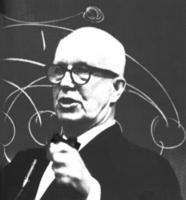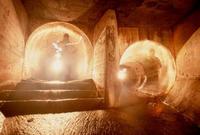| Monday, June 28, 2004 |
| Polymaths |
 What is a "polymath"? Dictionary.com: What is a "polymath"? Dictionary.com:
A person of great or varied learning; one acquainted with various subjects of study.You could also call it a comprehensivist. Waldzell: A polymath, as defined here, is a person with the knowledge and expertise of a specialist in several, usually non-overlapping, domains of knowledge or expertise. A comprehensive polymath, or comprehensivist, is a polymath with the ability to synthesize knowledge and expertise from any combination of domains.Some definitions describe it as some kind of genius, but that is not necessarily the point, even if the most famous polymaths probably have extraordinary genius. Think Leonardo da Vinci. But the point is probably rather a wide range of interest and general knowledge, and a certain urge to tinker with different things. Polymath Society: The dictionary definition of a polymath is a very learned person, of encyclopedic knowledge. There is also the connotation of having an understanding deeper than that found in an encyclopedia, that is, an expert in many fields.I haven't really used the word polymath much, but I've often said that I'm a comprehensivist. As mentioned, one sign might be one is skilled in several apparently unrelated areas. Which might seem puzzling to others, but which usually fits together as facets of a bigger picture, even if it might be invisible to anybody else but that person. Of course, calling oneself a polymath or comprehensivist can also be a cover for scattering oneself over many subjects without really getting anywhere with any of them. A euphemism for Attention Deficit Disorder. Well, I'm gonna leave that alone. The part I identify with is not particularly being a very learned person. I personally don't really have much to show for any extensive learning, certainly not in any academic field. Maybe rather the part about being able to synthesize knowledge and expertise from any combination of domains. Or the ability to span domains, and connect up different fields. People who only are specialists in one field might not notice the potentially valuable connections that field has with other very different fields. Somebody who has learned both fields might. But it is not necessarily needed to be thoroughly trained in both fields. It might simply be that one is tuned into looking for connections and synergies. And it might be that one is looking for something with doesn't quite fit in any category, any specialized field. Something that is found in a lot of fields, but which also is a little beyond all of them. For example, a certain connection between all things. The patterns that the whole is moving in. Maybe a certain aestetic. A certain sense of something that needs to be expressed. A few more recent writings on polymaths: Suw Charman wrote about A polymath in an age of specialists. Julian Elve about the Unpredictable Emergence of Learning. Mentions by Seb Paquet, Jim McGee. Julian adds up some key points: * Generalist / Polymath learning exists, contributes knowledge and helps the horizontal distribution of knowledge;OK, so we need people who go around combining things, poking into different fields, trying to connect things up. Agents of Emergence, I suppose. Looking for synergies, looking for things that might be possible. Or maybe just fluttering about and cross-polinating things by accident. And, yes, clearly blogging in a useful tool for all of this. [ Knowledge | 2004-06-28 15:37 | 2 comments | PermaLink ] More > |
| Sleepy City |
 I am terribly fascinated by underground exploration. Like natural caves, or the artificial tunnels and lost places under our cities. Exploring such things vicariously suits me just fine, so I'm glad there are folks who have the guts to crawl around in dangerous underground cavities. There are many sites for these activites. I mention some here. One I just ran into via wood s lot is Sleepy City, which has amazing pictures. I am terribly fascinated by underground exploration. Like natural caves, or the artificial tunnels and lost places under our cities. Exploring such things vicariously suits me just fine, so I'm glad there are folks who have the guts to crawl around in dangerous underground cavities. There are many sites for these activites. I mention some here. One I just ran into via wood s lot is Sleepy City, which has amazing pictures. Sleepy City is a photography site dedicated to the secrets of the city... your city. Underground tunnels, derelict industrial components and urban ruins are where I like to play. Discarded by society these interesting and historical sites wait quietly for the occasional urban explorer. Grab a torch and have a wander.Lots of photos. And beautiful words too. The city sprawls in all directions, a hectic mass infecting the earth it rests on. The buildings reach upwards and the root like tunnels burrow below. Citizens run madly, never considering the back alleys, tunnels and buildings of yesteryear. However these are places that, if you recognise them, hide the history and secrets of your city. Through the decaying doorframe or that unnoticed metal hole wait adventure and sights few will ever see. All it takes to step across into this parallel world is a torch and a curious spirit. No joining fees, no ridiculous contracts and nobody looking over your shoulder. You might be surprised how little of your city you have ever appreciated.Oh, and here's an interview at Creativity/Machine with the "mysterious urban explorer" behind Sleepy City. [ Culture | 2004-06-28 16:15 | 3 comments | PermaLink ] More > |
| Searching |
| Now, Google allows me to easily find a great many things I previous would have a hard time locating. If I know the name of something, I can learn about it very quickly. But it is still very difficult to find things I don't have good keywords for.
For example, I just thought about a letter I had seen somebody reference a while back, and I'd like to quote it, but I can't find it. It is peripherially on the subject of the state of education and how it might have been different at other times. There was this fellow in the 19th century, I believe, who was a school teacher and who wrote an application to be the editor of some dictionary or encyclopedia. He became the leader of the project, for decades. I forgot which dictionary or encyclopedia it was, though. And I don't remember if it was in the U.S. or in England. But it was mentioned on one of their main pages, as a historical note. His letter was at the same time rather humble, but also very impressive. He was just a teacher of some little small town schoolhouse, but he apparently had used his spare time for mastering a whole bunch of languages, particular romance languages, and other subjects. His letter is quite a gem of understated mastery. But all of that is too fuzzy for a google search, as I don't remember his name or any of the phrases he used. I need better tools. Or, hey, does it ring any bell with anybody? [ Information | 2004-06-28 16:58 | 9 comments | PermaLink ] More > |